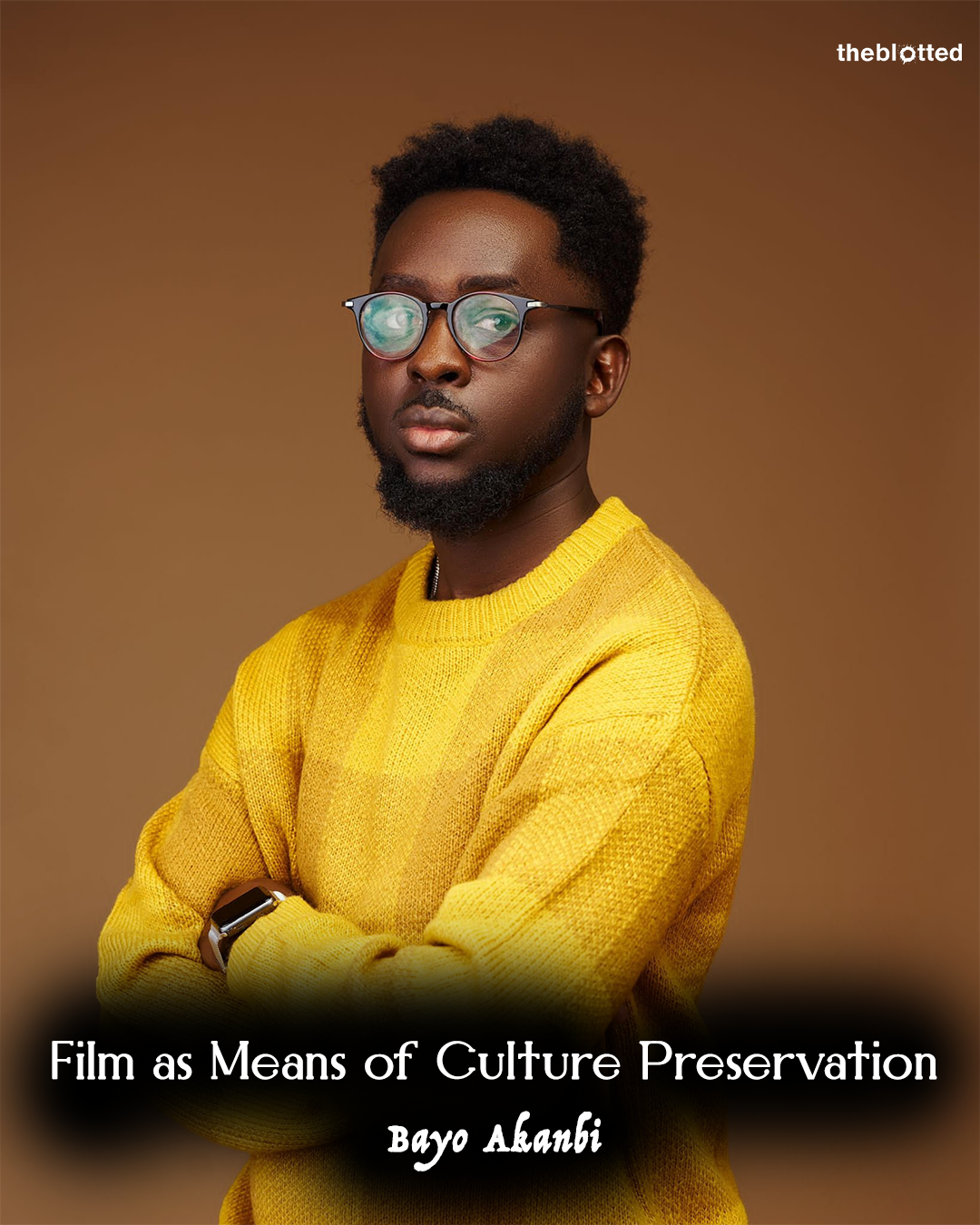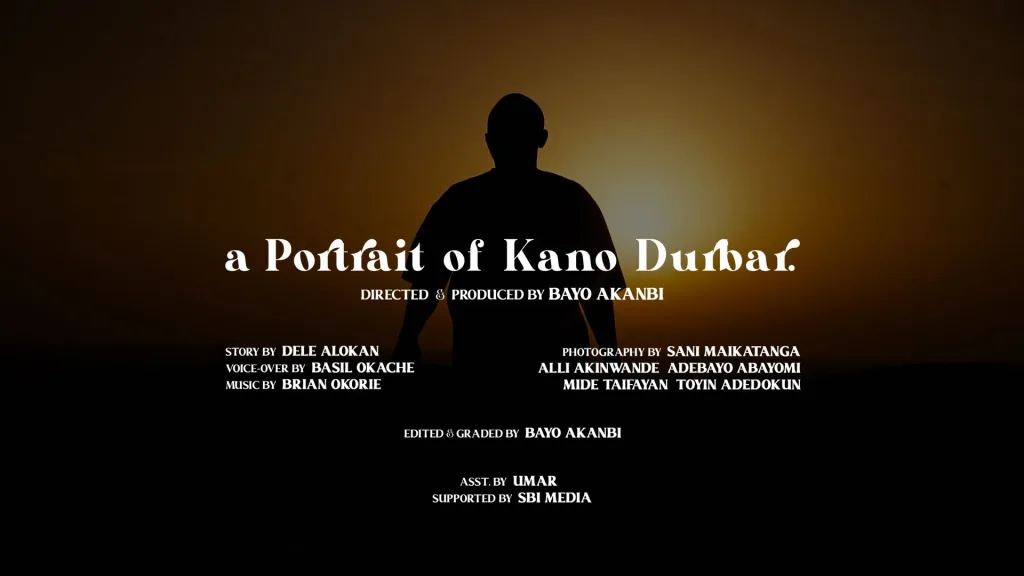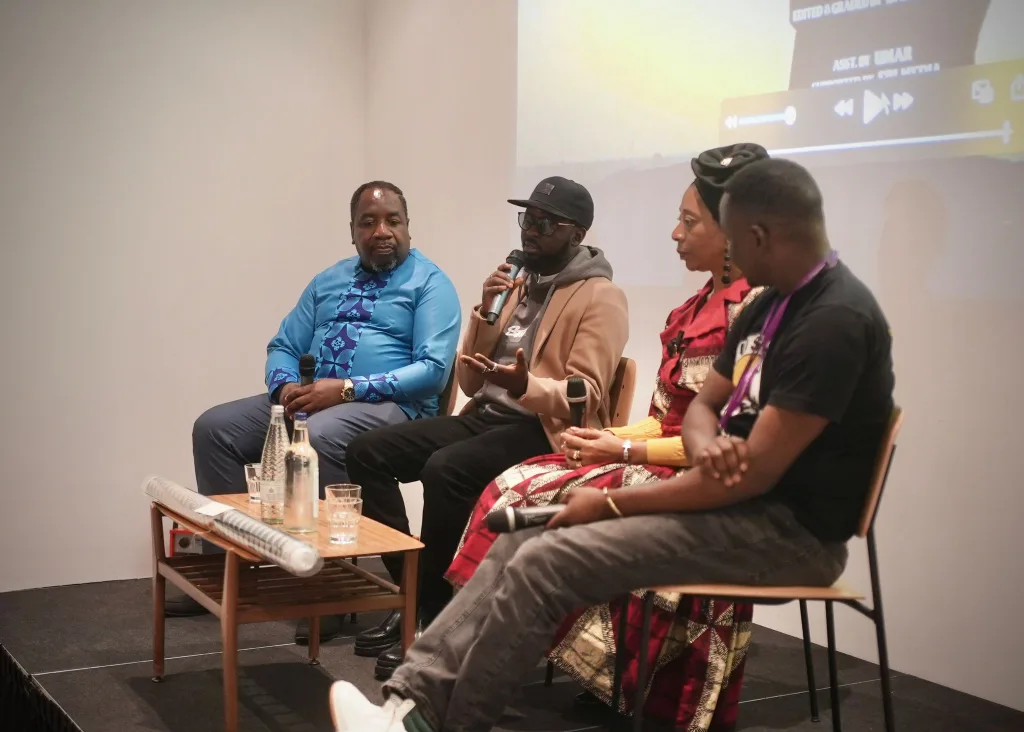Film as Means of Culture Preservation: Bayo Akanbi at Manchester Museum

The 15th of November, 2023 was a great moment for Nigerian excellence in the diaspora as Bayo Akanbi (Bayo Brahms) was invited by the Manchester Museum to screen a 15 minute documentary titled “A Portrait of Durbar.” This short film is about the annual Kano Durbar Festival; a statewide affair that people from all over Northern Nigeria, and neighboring countries troop in to experience.
The documentary spreads out through three parts of normal quiet Kano city life – a swampy rice farm which brings together communities to plant and harvest food for personal and commercial use; textile makers in Kwantin Gari market still using a pit that was dug 300 years ago; and a horse rider who works in the King’s palace. Shot over two visits to Kano, this film featured multiple scenes of daily living across road networks– suburban and urban areas.

Documentary Title Card, designed by Bayo Akanbi
Bayo Akanbi felt jittery during the event as most creatives would feel about their own works. “During the screening, I had mixed feelings. I was nervous and anxious” But this still didn’t prevent Bayo from taking in the moment at the show. “I was quite glad that my film was being shown to people who left their homes in winter to come support and witness. It was a great feeling.”
The film is explosive with its colours, shots of the festival are flamboyant. There is intrigue in the performers, heritage in the orators, royalty in the horse rides. “They were really into the film.” Bayo said “At one point, an attendee tried to cover her eyes because she was so immersed in the experience. It isn’t easy to grab a hold and maintain attention throughout but for this documentary, they were really into it the whole 14 minute duration.”
This project, filmed, edited and produced by Bayo Brahms came about as a labour of love. He was awarded some money at a SBI media training event and channeled it into travel and production costs. Bayo tapped writer, Oyedele Alokan; voice-over artist, Basil Okache and music producer, Brian Okorie to bring life into the project. “Portrait of Durbar” remains an intrinsic passion endeavor borne from an instinct to document homegrown culture.
This event was moderated by Dr. Njabulo Chipangura, a curator for the Manchester museum, featuring academics in culture and history; Professor Erinma Bell MBE DL JP and Dr. Charles Leyman Kachitsa, PhD from Liverpool Hope University and University of Salford, respectively. It was attended by over 35 people also passionate about the arts and ready to exchange ideas, ask questions and immerse themselves in what it takes to create quality work.



The Panel Session
When Bayo arrived at the screening, he was taken to the museum basement that had over 30,000 African items stored because there was no space. “I saw so many things whose origins were lost, their description too.” All he saw were rows and columns of artifacts stowed away beyond reach. From sacred and revered religious antiques to mundane traditional sieves taken from Zimbabwe. “The experience went as far as demystifying a lot of the objects that we place so much power into. Like the Sango mantlepiece which in Nigeria would be revered and only a priest would be allowed to touch it, but here, it is just another object.” Bayo said.
There are close to 100,000 objects from the colonial era from around the world that are held in British possession. 23,000 Chinese relics, over 1,000 Benin Bronze statues, the Rosetta stone, over 6,000 human remains– the list is almost endless. Conversations on restoration are centered around the Briton’s way of acquisition– where some claim they were purchased and others think they were looted. The museums stand on the argument that keeping the items in their care is the best way to ensure they’re properly preserved. And it seems these arguments, negotiations, and tussle will not end soon.
However, Africans coming across these materials in Europe often see them in a newer light. Bayo Akanbi offers some opinions on this: “For someone like me from Ikire that is very attuned with traditional ways of going about our daily lives; I realized there are some precious things that we take for granted at home. But they become easier to appreciate when we see it outside.”
Coming off of this documentary, Bayo forges ahead into newer projects inspired by the possibilities your passion can bring. He looks towards more stories that can help the world understand Africa, and most importantly– stories that will help Africa understand itself better. “It prompted me to start looking at other cultural stores that I can tell. Especially about my own culture, the Yoruba culture.” While in the Manchester Basement, Bayo saw the Ibeji figure, “Ibejis, twins in Yoruba culture are treated like gods “ he said.
This perspective reinforces the importance of romanticizing our own lives, telling our own stories. Bayo’s endeavor, and success with the screening also allays how major of a role culture exchange plays in maintaining the fabric of a modern and unified world. The more you learn about other people’s cultures, the greater the level of understanding will be within your dynamics.
Bayo Akanbi recently acquired a Master of Arts in Directing Film & Television at Bournemouth University and is currently based in London, where he works as a Film Editor.


Oladayo Martins August 9, 2024
So proud of your work Bayo! Well
done mate!